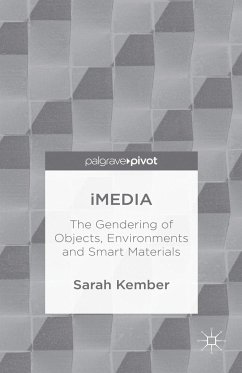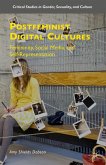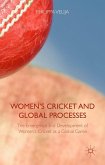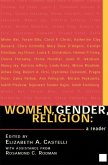What can queer feminist writing strategies such as parody and irony do to outsmart the sexism of smart objects, environments and materials and open out the new dialecticism of structure and scale, critique and creativity?
Drawing on science and technology studies and feminist theory, this book examines the gendering of current and future media technologies such as smart phones, Google glass, robot nurses, tablets and face recognition. Kember argues that there is a tendency to affirm and celebrate the existence of smart and often sexist objects, environments and materials in themselves; to elide writing and other forms of mediation; and to engage in disembodied knowledge practices. Disembodied knowledge practices tend towards a scientism that currently includes physics envy and are also masculinist. Where there is some degree of convergence between masculinist and feminist thinking about objects, environments and materials, there is also divergence, conflict and the possibleopening towards a politics of imedia.
Presenting a lively manifesto for refiguring imedia, this book forms an often neglected gender critique of developments in smart technologies and will be essential reading for scholars in Communication Studies, Cultural and Media, Science and Technology and Feminism.
Drawing on science and technology studies and feminist theory, this book examines the gendering of current and future media technologies such as smart phones, Google glass, robot nurses, tablets and face recognition. Kember argues that there is a tendency to affirm and celebrate the existence of smart and often sexist objects, environments and materials in themselves; to elide writing and other forms of mediation; and to engage in disembodied knowledge practices. Disembodied knowledge practices tend towards a scientism that currently includes physics envy and are also masculinist. Where there is some degree of convergence between masculinist and feminist thinking about objects, environments and materials, there is also divergence, conflict and the possibleopening towards a politics of imedia.
Presenting a lively manifesto for refiguring imedia, this book forms an often neglected gender critique of developments in smart technologies and will be essential reading for scholars in Communication Studies, Cultural and Media, Science and Technology and Feminism.
"The book is ambitious in its attempts to enter and problematise a number of seemingly disparate theoretical fields and to orient them around its main concern ... . The book invites its reader to rethink the future of critical praxis and of feminist media theory and to explore their potential to create iWorlds." (Neda Genova, Radical Philosophy, Vol. 2 (1), February, 2018)
"Kember gives contemporary feminist thought a whole circuit of theory-praxis, a welcome imperative for everyone involved in contemporary pedagogies often bereft of good training: Right now, write now." (Kevin Gotkin, Catalyst - Feminism, Theory, Technoscience, July, 2016)
"Kember gives contemporary feminist thought a whole circuit of theory-praxis, a welcome imperative for everyone involved in contemporary pedagogies often bereft of good training: Right now, write now." (Kevin Gotkin, Catalyst - Feminism, Theory, Technoscience, July, 2016)








